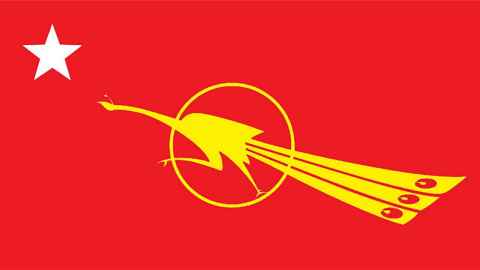Young Myanmar activists a force to be reckoned with
11 February 2021
Opinion: Young people in Myanmar are sidelined for being too immature or too radical. But they're the ones who have always risen to the occasion, writes Liyun Choo.

Last Friday, a Myanmar student activist I befriended a few years back sent me a public statement by the University of Yangon Students’ Union. The logo, a gold-coloured fighting peacock against a red background, caught my attention.
The Fighting Peacock has been an important symbol of student activism, democracy and resistance against authoritarianism in Myanmar since the colonial period. It was first used by the All-Burma Federation of Student Unions in the 1930s and then revived in the 1988 democracy protests as a symbol of resistance against the military.
In the 2015 and 2020 elections, many political parties continued to use the symbol in their political logos (including Aung San Suu Kyi’s National League of Democracy) to represent resistance against the military regime.
The critical role that young people have played throughout Myanmar’s political history has largely been forgotten until this most recent political crisis, the military coup of February 1, 2021 that brought an abrupt halt to the country’s short-lived democratic transition.
Seen as not-yet-adults and not-yet-full-citizens, young people in Myanmar are often sidelined in politics for being too young, too ignorant, too immature or too radical.
Yet, at major conjunctures in Myanmar’s political history, young people have always risen to the occasion. In the 1930s and 1940s, student leaders, including Aung San Suu Kyi’s father, led the struggle for independence and later became Myanmar’s first political leaders. Although Aung San Suu Kyi gained prominence internationally and nationally as the face of democracy during the 1988 democracy protests, the uprising was in fact started by students.
Young people are an important political force to reckon with in Myanmar, where 55 percent of the population is under the age of 30. This group has experienced the political and economic changes that came along with liberalisation in 2010 and will not accept the military putting the lid back on the freedoms they are beginning to enjoy. Many are devastated and angry about the return to the dark ages of military rule. They know that their futures and those of their families are tied to the country’s, and they are willing to take actions to safeguard their dreams.
Ordinary Myanmar citizens are doing what they can to defend their freedoms and lives.
Civil servants and medical personnel are part of the growing civil disobedience movement. Additionally, every night at 8pm, residents in Yangon beat their pots and pans and honk their car horns to voice their protest to the coup. Labour and student unions in Myanmar led peaceful protest marches in downtown Yangon to express their opposition to the military over Waitangi weekend. Citizens are also responding to calls to boycott military-related businesses. A local newspaper found that the sales of military-associated products and services such as Myanmar Beer and Ruby Cigarettes have dropped significantly.
To prevent young people from organising further resistance and rallying domestic and international support through social media, the military has been cutting off internet connectivity in Myanmar. But this move is only spurring my young friends (including the student activist) to do their utmost to let the world know what is happening in Myanmar and how its citizens are fighting against the military to the best of their ability.
No doubt this struggle for democracy is their battle to fight, but we, as members of the international community, can support them by spreading the word about their brave resistance against the military, by condemning the military coup and by letting these young people know that they have been heard.
Dr Liyun Wendy Choo is a professional teaching fellow in the Faculty of Education and Social Work.
This article reflects the opinion of the author and not necessarily the views of the University of Auckland.
Used with permission from Young Myanmar activists a force to be reckoned with 11 February 2021.
Media queries
Alison Sims | Research Communications Editor
DDI 09 923 4953
Mob 021 249 0089
Email alison.sims@auckland.ac.nz